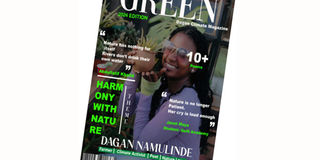Why green literature is timely for a sustainable world

What you need to know:
To change this functional illiteracy amongst our youth, Green Magazine is here to ensure that people not only read, but also actively develop our society by doing so
Title: Green Dagan Climate Magazine
Editor: Jolly Joy Mawerere
Price: Shs20,000
Available: [email protected]
Pages: 37
Published: 2024
Philip Matogo
My neighbour’s nine-year old son found me holding a magazine.
“What is that?” the boy asked me.
“It is a magazine,” I replied.
He looked at me blankly, so I asked him, “Do you read magazines?”
“I only know magazines that go with guns,” he replied.
Poor child, the household he lives in is clearly more interested in Rambo than Time Magazine.
To change this functional illiteracy amongst our youth, Green Magazine is here to ensure that people not only read, but also actively develop our society by doing so.
“In an era where the urgency to reconnect with our environment has never been more paramount, it is with immense pride and joy that I introduce this unique compilation of poems and articles centred around the theme of ‘Harmony with Nature’ “ writes Dagan Namulinde, the founder of Green Magazine.
“As the team leader and founder of Green Magazine, is to create a platform where voices from diverse backgrounds can converge to celebrate, reflect upon, and advocate for the beauty and sanctity of our natural world.”
Environmental or green literature is critical to a sustainable and healthy world. Not only does it englobe diction of a creative bent, it also gives us the literary and intellectual tools ashine with helpful information.
This information helps us reflect on our lives as co-inhabitants of a planet. Furthermore, such literature helps us to smell the proverbial roses as it directs our gaze to the open-mouthed wonders of the natural world.
In turn, this focus promotes and champions a relationship that we all too often tend to overlook or forget - our primal connection with nature.
This is why Green Magazine, written by the politically infamous Gen Zs, is such a coup in the world of reading and learning, no less.
Samie Mr Poet shows us why with his poem titled “Green”:
“Beneath the sun’s relentless glare,
Our world cries out, in desperate despair.
Oceans rise, their tides unfurled, .......
To nurture, protect, and set Earth free.”
This poem reveals the earnestness incarnated and projected by the contributors to this magazine. The poem is fairly solid, and nuanced by the use of descriptors such as “desperate despair.”
There is a thin line between these words, with despair you are cast adrift on the fitful seas of your own misfortunes and have no hope. You are immobilised by dread and do not want to do anything. In desperation, you have no other hope but to raise your proverbial fists and fight, struggle.
Then we have an article by Tyra Kabugo Nassali, who calls herself “a student of life, of art. On the brink between teenagehood and her 20’s.”
“To start, we need to examine the status quo regarding Uganda’s climate. According to a scientific paper on Uganda’s energy and climate nexus, the melting of ice caps on Mt Rwenzori has led to the increased occurrence of droughts, rainstorms, flooding and landslides within the last three decades,” she writes.
“This can be seen in the case of the recent and recurring landslides in Bududa district. Keeping the status quo in mind, the only way to rectify the adverse effects of climate change, especially global warming, are through understanding a one niche problem Uganda faces….” Read more about this “niche problem” in this invaluable magazine.




